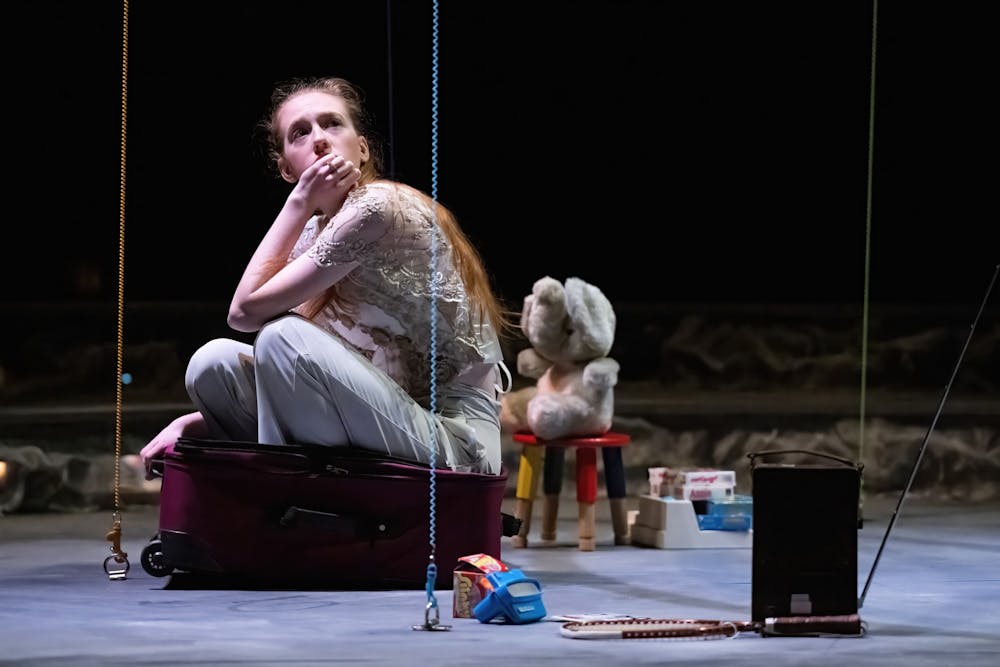Last weekend, lights in the Center for the Arts’ (CFA) Black Box Theater dimmed before whirring back to life on a vibrant beach scene, plunging theatergoers into a haze of nostalgia. The beginning of UB’s production of Sarah Ruhl’s “Eurydice” is sweet but tainted by the sense that this moment is fleeting, fated to fade.
On the day of Eurydice’s (senior theatre performance major Moriah Armstrong) wedding to her charmingly absentminded lover Orpheus (senior theatre performance major Nicolas Torres), she was lured away from the party by the promise of a letter from her deceased father (junior sociology major Alex Reiser). After a somewhat steamy encounter with the creepy lord of the underworld (junior theatre performance major Quinn Petkus), Eurydice tripped from the top of the stage’s central set element: a gigantic staircase representing a mountain. In a series of rapid blackouts, Armstrong stumbled down the set before lying lifeless at its base.
Eurydice arrived in the underworld — a grim place where laughing, dancing and love are strictly prohibited — with an umbrella, an empty suitcase and no memories. Eurydice reunited with her deceased father, who constructed a forbidden room for her from string.
Even though both fathers and rooms were not allowed in the underworld, Eurydice’s father spared no expense.
“The costume designer described [his] outfit like a Jolly Rancher that had rolled underneath the couch, and he’s like that mentally too,” Resider said. “But he’s got this silver nugget of a personality, and that’s his love for his daughter, that’s what compels him to build the string room.”
Eurydice’s father even endeavored to teach her how to read again, having miraculously maintained this skill unlike most of the afterlife’s inhabitants.
“Playing Eurydice was especially important for me because of the relationship with her father,” Armstrong said. “I’m very close with my father. And so it was just a way for me to pour my love of the craft and my dad and everything that the show is really about [into this production].”

Moriah Armstrong (left) as Eurydice on stage with Nicolas Torres (right) as Orpheus.
Meanwhile, Orpheus transformed from a well-meaning yet somewhat preoccupied himbo into a case study of grief and existential dread, attempting to contact Eurydice with worm-delivered letters and calls via a Fisher-Price toy phone.
From one entrance to his next, Torres juggled a wide range of emotions as an actor. One minute he was hopeful and determined, the next frustrated and then suddenly consumed by his mourning.
“One day, I really, really let it in, and I just sobbed uncontrollably in the rehearsal space,” Torres said. “And people were like, ‘Oh, are you OK?’ And I’m just like, ‘No, I’m really believing it. I’m really in it right now.’”
Musical composition was essential to Torres exploring this emotional process. In “Eurydice,” Torres wore many hats, portraying Orpheus while also writing various musical numbers for the show. Orpheus’ sorrowful symphony for his departed wife, the rock orchestra that illustrates his descent into the underworld and the heart-wrenching final number are all credited to Torres. The music only heightened Torres’ vulnerability on and off stage.
“I was fighting back tears,” Torres admitted. “The second I left at this show, I just collapsed on the door on the other side of the airlock and I was just a mess.”
Even though “Eurydice” constantly tugged at the heartstrings, every moment of the show left room for pockets of light in the darkness of the underworld.
Petkus created much of that levity with his portrayal of the lord of the underworld. Following a rather serious scene, Petkus emerged from behind a curtain on a blinged-out tricycle, pedaling around the mountain as hard rock music blared. The sheer absurdity of the moment had the audience in stitches.
Of course, in the second act, Orpheus and the lord of the underworld struck the Greek myth’s classic deal: if Orpheous can exit without looking back at his beloved, both he and Eurydice can rejoin the living.
Although the couple was unsuccessful in this endeavor, UB’s production departed from Ruhl’s original ending. Instead of Eurydice lying lifeless on the ground, she remained by the river of forgetfulness where she encountered a now-dead and equally mind-wiped Orpheus, his tie wound tightly backwards around his neck, symbolizing a noose.
In the play’s final moments, the lovers circled each other on stage as strangers. A string tied around Orpheus’ finger — just like the one he proposed to Eurydice with in the play’s first scene — indicated that, just maybe, all hope was not lost.
“We changed it to add that ambiguity,” Armstrong said. “We wanted to leave it more open to the interpretation that they would find each other again.”
Armstrong, months away from graduation, said her experience with “Eurydice” helped her finish her collegiate acting career “proud and excited.”
Over the course of the show’s run, Armstrong grew into this intimidating lead role. Initially frustrated because of her dislike for Ruhl’s play, Armstrong found herself drawn to the unconventional nature of UB’s vision for “Eurydice.”
“When we came into our first rehearsal, our director Jon Elston explained his vision for the show, and we talked through all of the metaphors and allegories,” Armstrong remembered. “Within that first rehearsal, I was so thrilled to be able to play Eurydice. I was sold. I was like, ‘Oh, this is gonna be the best show ever!’ And it has been.”
Even when dealing with the extreme emotions that accompany death, loss and grief, the cast, crew and creative team of UB’s “Eurydice” breathed new life into Ruhl’s material with an out-of-the-box set, unexpected gimmicks (like freakishly tall pants and tricycles), original music and a reimagined resolution.
Whether in the land of the living or buried six feet under, the end of this production is surely worth mourning.
Alex Novak is an arts editor and can be reached at alex.novak@ubspectrum.com
Alex Novak is a senior arts editor at The Spectrum.





